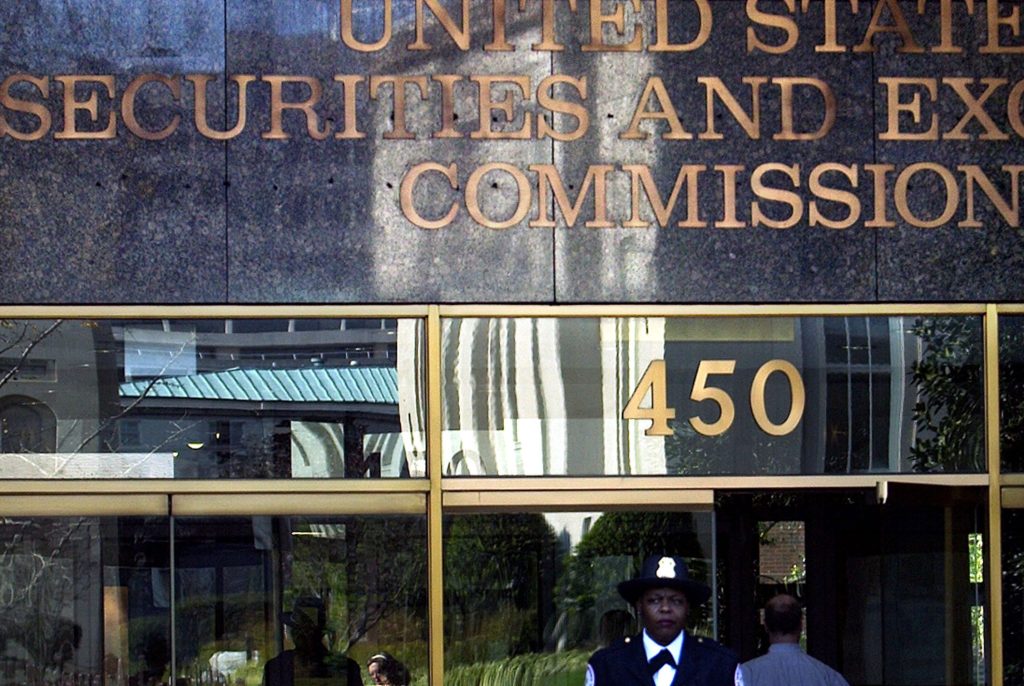In charges that mark the first violation of the agency’s amended marketing rule, the SEC announced charges against Titan Global Capital Management USA LLC on Monday.
The New York-based fintech investment adviser was charged with using hypothetical performance metrics in advertisements that were misleading, plus compliance failures that led to misleading disclosures about custody of clients’ crypto assets, use of improper “hedge clauses” in client agreements, unauthorized use of client signatures, and the failure to adopt policies concerning crypto asset trading by employees.
The order also finds that Titan violated the marketing rule by advertising hypothetical performance metrics without having implemented required policies and procedures or taking other steps required by the rule.
Misleading statements
According to the SEC’s order, for a period ranging from August 2021 to October 2022, Titan, which offers multiple complex strategies to retail investors through its mobile trading app, made misleading statements on its website regarding hypothetical performance, including by advertising “annualized” performance results as high as 2,700% for its Titan Crypto strategy.
The order alleges that Titan’s advertisements were misleading because they failed to include material information, for example, that the hypothetical performance projections assumed that the strategy’s performance in its first three weeks would continue for an entire year.
The order also finds that Titan violated the marketing rule by advertising hypothetical performance metrics without having adopted and implemented required policies and procedures or taking other steps required by the marketing rule, which was amended in December 2020.
Other compliance failures
The SEC’s order further finds that Titan:
- made conflicting disclosures to clients about how Titan custodied crypto assets;
- included in its client advisory agreements liability disclaimer language that created the false impression that clients had waived non-waivable causes of action against Titan; and
- contrary to representations, failed to adopt policies and procedures concerning employee personal trading in crypto assets.
The order notes also that Titan self-reported to the SEC staff that it failed to ensure that client signatures were obtained for certain types of transactions in client accounts.
“Titan’s advertisements and disclosures painted a misleading picture of certain of its strategies for investors. This action serves as a warning for all advisers to ensure compliance.”
Osman Nawaz, Chief SEC Enforcement’s Complex Financial Instruments Unit
“When offering and marketing complex strategies, investment advisers must ensure the accuracy of disclosures made to existing and prospective investors. The Commission amended the marketing rule to allow for the use of hypothetical performance metrics but only if advisers comply with requirements reasonably designed to prevent fraud,” said Osman Nawaz, Chief of Enforcement’s Complex Financial Instruments Unit.
“Titan’s advertisements and disclosures painted a misleading picture of certain of its strategies for investors. This action serves as a warning for all advisers to ensure compliance.”
Titan cooperated with the investigation and consented to the entry of the SEC’s order finding that it violated the Advisers Act. Without admitting or denying the SEC’s findings, Titan agreed to a cease-and-desist order, a censure, and to pay $192,454 in disgorgement, prejudgment interest and an $850,000 civil penalty that will be distributed to affected clients.
The amended marketing rule
In December 2020, the SEC finalized amendments to its advertising and solicitation rules under the Investment Advisers Act of 1940, as amended, merging the Advisers Act’s current advertising rule (Rule 206(4)-1) with the cash solicitation rule (Rule 206(4)-3) under a new rule: Rule 206(4)-1, the Investment Adviser Marketing rule.
For example, the rule now requires advisers to standardize certain parts of a performance presentation to help investors evaluate and compare investment opportunities and includes tailored requirements for certain types of performance presentations.
Advertisements that include third-party ratings are required to include specific disclosures to prevent them from being misleading. Testimonials and endorsements, which include traditional referral and solicitation activity, are permitted, subject to certain conditions.
In this case, the SEC found that some of the required disclosures for the hypothetical performance were only available through hyperlinks.
SEC-registered investment advisers needed to comply with the new marketing rule by November 4, 2022.
In June, the SEC’s Division of Examinations published a Risk Alert to inform investment advisers, including private fund advisers, about additional areas of emphasis during examinations focused on the amended Marketing Rule.
Lessons from the case
Several lessons emerge from this case decision, including:
- Have policies and procedures specially addressing the use of hypothetical performance to ensure the SEC’s new rules on how advertisements can include them, especially noting that the agency has said it believes investment advisers generally cannot present such performance data to a mass audience or for general circulation, because the adviser would not know about the recipients’ financial situations.
- Make sure required disclosures are contained within the advertisement somewhere; in this case, the SEC found that some of the required disclosures for the hypothetical performance were only available through hyperlinks.
- The marketing rule was a substantial focus of the case, but the SEC also observed that the firm improperly included hedge clauses (which limit an adviser’s liability) in its agreements with retail clients. Hedge clauses, like the marketing rule amendments themselves, were specifically mentioned in the Division of Examination’s 2023 priorities.

















